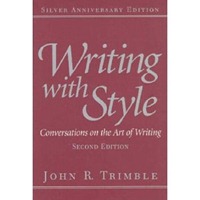I wish I had read this book twenty years ago. It existed, but I was unaware of it. There may be others equally good or better, but I don’t know of them. I do know that if I had read it twenty years ago, I would have read it several times since, and my writing would have been better for it.
There are probably many boring books about writing in the world. Writing with Style is not one of them. I thoroughly enjoyed reading this book. I laughed out loud frequently. I did not want the book to end. Why? Because the book itself was an example of what it was trying to teach: how to write so that people want to read what you write.
For example, the author suggested that surprise is a valuable element in the writer’s toolbox. And he used it effectively many times. 
I will never forget his chapter on revising. And it’s only 8 lines long.
The “Fundamentals” section includes chapters on openers, diction, superstitions, and proofreading. The “Odds & Ends” section includes such things as a chapter on punctuation, but if you ‘re not ready for a rather lengthy discussion of the rules and why they exist, you can skip it. The last 25 pages are quotes from writers about writing.
The book is filled with great quotes, helpful tips, and personal examples. I read the second edition, which was published on the 25th anniversary of the first edition, and I felt like I was enjoying the fruits of 25 years of continued learning, revising, and improving the book. As I go to check the link on Amazon, I see a 3rd edition is available (and the price is much too high for a thin paperback). The 2nd edition is available used for much less.
I’d like to require this for every class I ever teach in the future.


